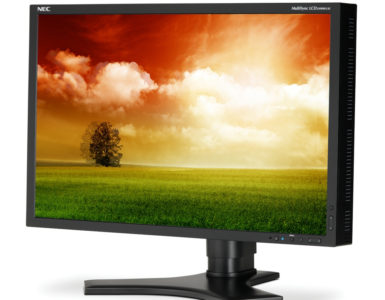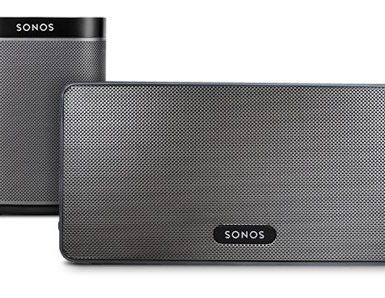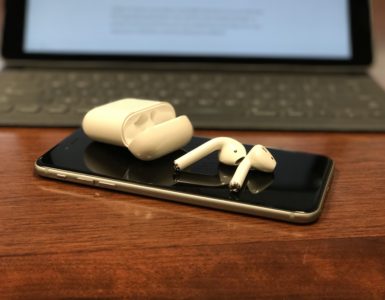The difference between Amazon and Apple is this: Amazon is very much in the ebook business to sell ebooks. They want you attached to their platform. That's why the Kindle Reader is on both PC and iPhone, as well as the eponymous e-ink device. Ebooks are huge for them. They sell six ebooks for every 10 physical books. That's why they want to own the market. Apple, on the other hand, sells content in order to sell hardware. The iTunes Store, the App Store and the brand-new iBooks Store exist so you'll buy iPods, iPhones and iPads, which is where Apple really makes money. iTunes revenue is just a bonus, though an ever fatter one with the explosion of the App Store.
via gizmodo.com
I've loved paying $9.99 or less for new release books, and Amazon's discounts have been very successful at driving ebook adoption. (I won't even buy hardback books anymore.) But as products like the iPad expand hardware options beyond Amazon's Kindle, publishers will leverage that variety to raise the price of ebooks by denying rights to deep discounters.
I still believe that an ebook edition of a book *should* cost less than a bound copy. In distributing ebooks, the publisher doesn't incur any printing, warehousing, or shipping costs. So the question remains: as publishers force higher ebook prices, will people like me continue to feel as good about ebook purchases?
For now, I'm not sure.





Greed is good as once was said except in the case of eBooks where publishers may kill the Golden Goose before it has a chance to hatch. I think paying huge inflated amounts for ANY media is a bad idea. These media heads talk themselves into a perceived “value” play (aka how much can we gouge customers before they balk) whereas customers just want to pay a reasonable price and be able to buy MANY instead of forced to being selective. Certainly it prevents people from taking risks on new authors, etc.
Personally I think books should be in the free to $2.99 to 7.99 range. Movie downloads $2-3. “This is reality Greg.”
Several booboos here.
@Gizmodo: Amazon does not say they sell 6 e-books for every 10 physicals, merely that ratio for a book that presents itself in both formats. For those of us not in the thrall of Dan Brown and other middlebrow best-sellers, Amazon shows an inset saying, “pester this publisher to incur the extra costs for a Kindle version that’ll undercut your other sellers’ willingness to promote your book.”
@madebymark: since all the ebook sellers combined have achieved nowhere near 100% takeover of the bookselling business, e-books are a small fraction of most titles’ sales. Publishers still have all the costs of setups, warehousing, print runs, and most of the costs of shipping, etc. Will for some time.
If you’ve ever had anything to do with printing or publishing, you must know that fixed costs to create the first copy can be high, while subsequent copies’ costs are much lower. So until publishers can cut loose of the dead trees’ versions, ebooks are just another fact of life for an industry that doesn’t make a lot of money.
A couple of writers have blogged on this: professional publishing involves something like $20K before a book can go to the presses or even the ePub converter.
Finally, @PaulG, you’re welcome to your opinions, but if you work out the math it doesn’t work out, so better hope the tooth fairy is good to you. Booksellers buy books at 50¢ on the dollar, so $2.99 retail means $1.49 to the publisher. If the publishers charge the author just that $20K for their work, you, the author, would have to sell 53,000 copies/year to make a $60K/year income from your writing. But only a tiny fraction of authors sell anywhere near that number, plus there are genuine up-front printing costs, so the $2.99 price means that your fantasy price would starve out the very “new authors” you purport to help. For most of us, wasting a few hours reading a dud book are worth a lot more than the extra $10 to buy a recommended or known author.
The fact that the author of this article no longer wants to buy hardcopy of his books goes to show how Amazon has greatly diminished the worth of books through its all-you-can-eat $9.99 price.
I would rather have the market determine the price of a book.
A medical book, for example, may be worth $100 for the targeted consumer – doctors. Certainly the authors and publishers of such a book would not want it sold at $9.99, given the effort needed to create such a book.
The iPad allows publishers to charge whatever price they want – not just the $14.99 maximum. If you look at the medical apps section of the iTunes store, you will see medical books selling for up to $300. They are worth that price.
There are also books for free. Just download Stanza and you can read any book in the public domain for free – including all the classics, including Shakespeare.
Amazon sells these books for $9.99. These are definitely not bargains when all they are are black and white text.
I appreciate the comments. Some quick notes:
@JamesKatt assumes I’m no longer buying physical books because of *price.* This isn’t true. I’m no longer buying physical books because I’m now addicted to the convenience of being able to search, annotate, and carry my entire library with me on one extremely portable device.
@JamesKatt is correct that free public domain books are for sale on Amazon, but it’s hardly accurate to say, “Amazon sells them.” These are public domain books, hastily formatted for the Kindle by individuals who then set a price and sell them through Amazon in hopes that buyers will be willing to pay for the convenience of purchasing them directly from the Amazon store. I think most anyone savvy enough to use a Kindle knows these books are available for free … and where to go to get them.
@WaltFrench makes a good point: setting up a printed book run is expensive, and ebooks remain a tiny fraction of the book market. But let’s be honest: the publisher’s dedication to the most expensive means possible for reproducing and distributing books is strictly a result of the publisher’s failure to leverage new technology to put authors’ works in readers’ hands. Instead of charging me more for a product that costs far less to produce, the publisher needs to abandon a broken business model and embrace digital technology.
@Mark, you and I look to the future and see the same thing. The difference is that I think the real world is going to make the transition much more difficult than you wave away with “the publisher needs to abandon a broken business model…”
That “broken” model is the only one that pencils out right now; publishers cannot afford to stop printing the dead trees versions because those constitute 95%+ of sales. (I would be delighted to be corrected on that SWAG.)
It’s as if you said, “Detroit needs to abandon gasoline-powered cars and go all-electric.” Move towards that future, yep, I guess. Today, with zero infrastructure, guaranteed hostility to change by a good fraction of consumers, billions of retooling costs by a bankrupt industry, utterly impossible.
So what does it mean that publishers have failed to leverage new technology? The Kindle has been around just a short time, and its non-subsidized brethren have not caught on at all. The publishers obviously *are* working with all possible new channels, and I’m sure they’d be happy to free themselves of those ink-stained printers who are just costs for the publishers.
Since Amazon is, to date, the ONLY firm “successfully” making an e-books business, it’s worthwhile to examine why they afford to subsidize the $9.99 best-seller price (to give readers a reason to buy their $250 device and to freeze out competition, I’d *guess*).
It’s also worth looking at authors’ take on the deal, since ultimately we’re looking at a battle for firms that want to profit by getting in the middle of authors and readers. Charlie Stross has been very vocal at his blog; well worth wandering thru a somewhat lengthy mess.
While we’re at it, maybe it’d be a good time to declare your own financial interests in this fight… got anything riding on Amazon’s success here?
I believe the author WaltFrench is referencing, http://www.tobiasbuckell.com/2010/01/31/why-my-books-are-no-longer-for-sale-via-amazon/ was calculating the costs involved whether you were just making an ebook version or a traditional physical one. They were for the editing, proofreading, typesetting, design, and art needed to polish a book to a professional form.
So his calculations would still be relevant to any model based on pure digital products. Considering that ebooks are cannibalizing physical book sales, publishers certainly can’t be expected to be happy with a pricing model that’s unsustainable without subsidy.
Everyone I’ve heard from in publishing has stated that the printing and distributing of books is actually quite a bit smaller piece of the total cost than consumers like to think. And that the previous model was only working out for Amazon and not the authors or publishers who create the content. So shouldn’t they set the prices and the market decide on accepting them or not?
And as a book lover myself, I always sampled from the library or a friend if I wanted to see what a new author was like. Don’t most ebook stores give you a snippet of the work to sample as well?
Tobias Bucknell had another interesting post about the real price spread of ebooks, http://www.tobiasbuckell.com/2010/02/05/why-do-people-want-more-expensive-backlist-books/.
As he points out, Amazon doesn’t actually list all new release ebooks at $9.99, just the popular ones. (His was listed at $12.50) And Amazon also makes up for it in a high price for backlisted books. You know, the ones you waited for the paperback versions to buy. These are books that the publishers would be glad to sell for less as they’ve already recouped much of the initial cost of publishing. So these are the books that would very likely fall in price under a new agreement.
Don’t ever believe Amazon marketing that they’re really looking out for the consumer. The figures behind the marketing show that they get a very good profit. The $9.99 price really is a loss leader for the other books and to get you hooked into their proprietary system. Only Kindle software can display Amazon books, and Kindle hardware won’t display the more standard ePub format from other stores.
Walt wrote: That “broken” model is the only one that pencils out right now.
Mark notes: The printed books model is the only one that pencils out for *publishers* perhaps — but they aren’t the only players in the game.
It is very much in an author’s best interest to connect directly with readers and recoup revenues now lost to the obscene overhead associated with traditional publishing. Again: instead of asking, “How can we dupe the public into believing a book must cost more than $9.99?” publishers should be asking, “How are we going to remain relevant in a world where authors can go directly to their readers and bypass us entirely?”
Walt writes: While we’re at it, maybe it’d be a good time to declare your own financial interests in this fight… got anything riding on Amazon’s success here?
Mark says: I am not employed by, contracted to, or connected with Amazon.com or Apple. I don’t own stock in either company. I’m not a shill.
I’m a Kindle owner, and I purchase several books a month for my Kindle — but I expect to be reading those shortly through a Kindle app on a iPad, so I can’t say owning a Kindle has wedded me to Amazon.com’s hardware solution.
I’m an author, and I make money whenever Amazon.com sells a physical or digital copy of my work — but I also make money when other dealers do, so, again, there’s no special tie to Amazon.com here.
How about you?
Kiyoshi wrote: Everyone I’ve heard from in publishing has stated that the printing and distributing of books is actually quite a bit smaller piece of the total cost than consumers like to think. And that the previous model was only working out for Amazon and not the authors or publishers who create the content. So shouldn’t they set the prices and the market decide on accepting them or not?
Mark notes: Two quick comments:
– The publishers I have personally worked with claim that printing, warehousing, and shipping books are their biggest expenses. The advent of print-on-demand and digital distribution eliminates all of these expenses (and most of the reasons for working with publishers, for that matter).
– Publishers may not control what Amazon.com or Wal-Mart may sell a book for … but they DO control the wholesale price of both printed books and ebooks. Even if Amazon.com sells these books for a loss, that loss does not directly impact the publisher (who still gets whatever wholesale price they set) or the the author (whose royalties are usually based on wholesale — not retail — prices).
Mark wrote: – The publishers I have personally worked with claim that printing, warehousing, and shipping books are their biggest expenses. The advent of print-on-demand and digital distribution eliminates all of these expenses (and most of the reasons for working with publishers, for that matter).
Ah, then your experience differs greatly than other author’s reported experiences. I won’t try to refute either side as I don’t have direct experience with it, but I do wonder where the truth lies or if it simply has more variables that change the model. As for diminishing reasons for working with a publisher, here’s another author’s very different take on it, http://yuki-onna.livejournal.com/563086.html. If every author self-published, I can imagine wading through a LOT of drek. And authors would have to take on all of the cost and risk up front, after spending time writing without seeing any income off it till it’s finally finished. (Stephen King tried to be paid by fans to keep writing. That experiment didn’t work so well.)
Mark wrote: – Publishers may not control what Amazon.com or Wal-Mart may sell a book for … but they DO control the wholesale price of both printed books and ebooks. Even if Amazon.com sells these books for a loss, that loss does not directly impact the publisher (who still gets whatever wholesale price they set) or the the author (whose royalties are usually based on wholesale — not retail — prices).
That would be true to a retail model for selling (of which Amazon is both retail and wholeseller), however Amazon wants to also be considered a publisher with associated rights. In fact their proposed 30/70 split of revenue that they announced right before Apple showcased the iPad had many other restrictions including not letting any other store sell the ebook for less than Amazon’s price.
Also of interest, Joshua Bilmes reports http://www.tobiasbuckell.com/2010/02/06/joshua-bilmes-on-ebook-author-royalties/ that some author are paid a percentage of ‘listed’ price though most are getting a percentage of ‘net’ now.
Mark notes: The printed books model is the only one that pencils out for *publishers* perhaps — but they aren’t the only players in the game.
It is very much in an author’s best interest to connect directly with readers and recoup revenues now lost to the obscene overhead associated with traditional publishing. Again: instead of asking, “How can we dupe the public into believing a book must cost more than $9.99?” publishers should be asking, “How are we going to remain relevant in a world where authors can go directly to their readers and bypass us entirely?”
Kiyoshi writes: Publishers aren’t the only players, but they AREN’T the only ones who mostly benefit from the ‘printed books’ model. That is still where most authors get the bulk of their income from. The ebook sales are a pitance in comparison. And even an author who found some success there http://yuki-onna.livejournal.com/563634.html admits that it was a ‘perfect storm’ and is unlikely to be the experience of others.
And though I wholeheartedly agree that authors should develop the connections to their readers, that really doesn’t make the publishers irrelevant. They still provide many, many services that authors will find helpful. But that relationship can certainly be improved and more choices for creators is good.
Kiyoshi wrote: Ah, then your experience differs greatly than other author’s reported experiences.
Mark notes: It’s entirely possible this set-up differs from publisher to publisher.
Kiyoshi wrote: If every author self-published, I can imagine wading through a LOT of drek.
Mark notes: Even without authors self-publishing, there’s a lot of drek. Once the role of the publisher is diminished, readers will simply do more of what they already do today: find worthwhile books through reviews and recommendations.
Kiyoshi wrote: Authors would have to take on all of the cost and risk up front, after spending time writing without seeing any income off it till it’s finally finished.
Mark notes: That’s a straw man. Here’s why: while brand-name authors do get large advances, they are the exception, not the rule.
Most of us get very small advances; niche non-fiction authors regularly write books without any advance at all.
And, of course, any advance is just a loan against anticipated sales. Should one book fail to earn out its advance, the author will have a heck of a time getting another advance (or contract!) for the next.
Kiyoshi wrote: [Printed books are] still where most authors get the bulk of their income from.
Mark notes: For now.
Kiyoshi wrote: The ebook sales are a pitance in comparison.
Mark notes: For now.
Kiyoshi wrote: And though I wholeheartedly agree that authors should develop the connections to their readers, that really doesn’t make the publishers irrelevant.
Mark notes: For now. 🙂
Mark notes: For now. 🙂
Kiyoshi wrote: Oh, I agree. This model will change. I just think that rumors of its death are greatly exaggerated. So many readers seem all ready to bury it and are busy digging its grave. Yet don’t give much thought to the transition for everyone. Some even take a callous Darwinian attitude to that phase, and then set up an SEP field around it. And somehow I don’t think that Amazon is the one to be trusted with everyone’s best interests.
As I mentioned elsewhere, even in a purely digital market like Apple’s App Store, while the democratization of creators directly selling to the consumer is great, both the sellers and consumers complain about the mountain that needs sifting through to find things of value. So application publishers come in and help the developers get showcased and build up a reputation as a publisher for quality product.
So I still see merit in a role for publishers. Some writers will choose to go it solo and develop all of the skill they will need to succeed or sink from sight. Others will choose the umbrella of a publisher for support and recognition.
Choice is good. And both have a chance of success. It really doesn’t need to be either/or.